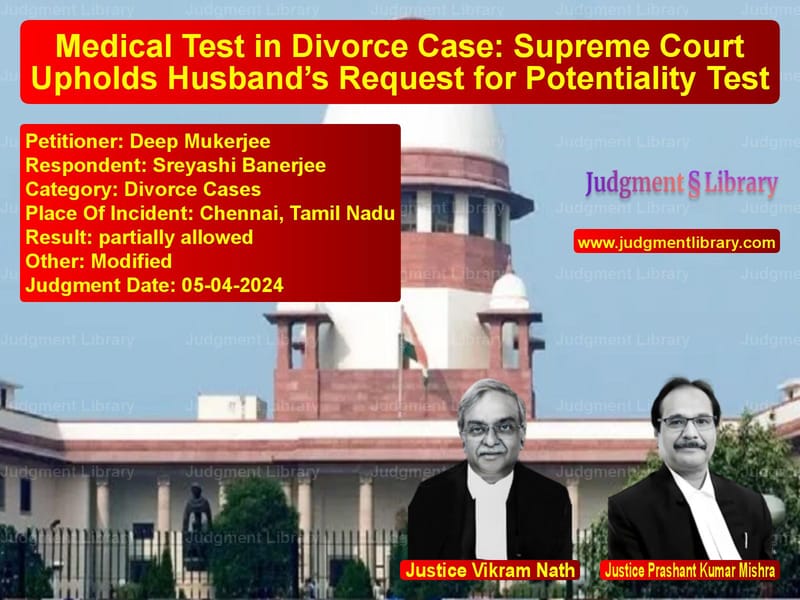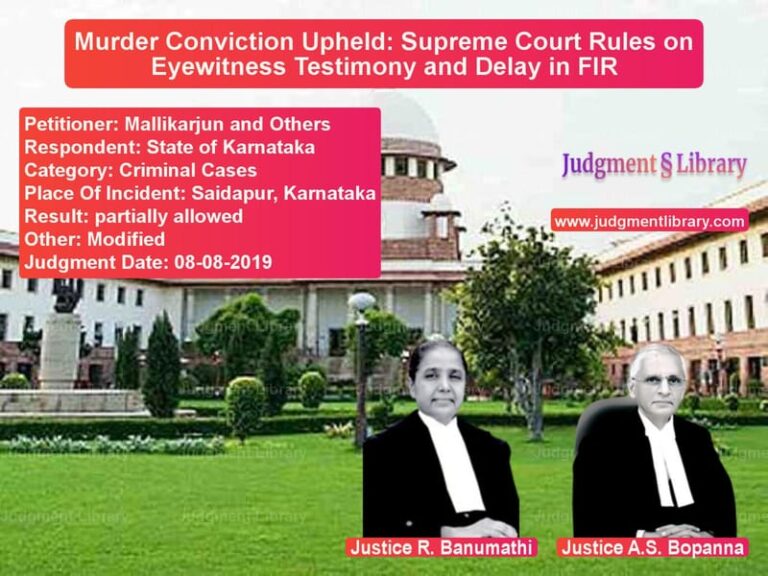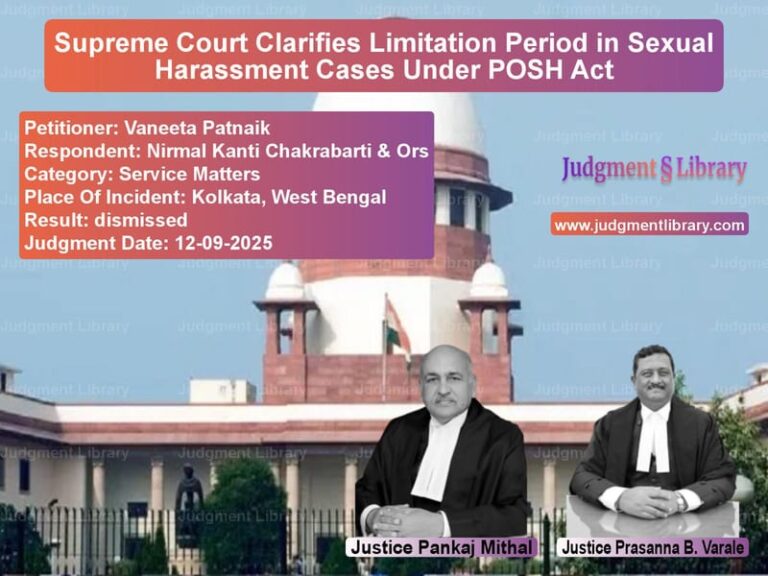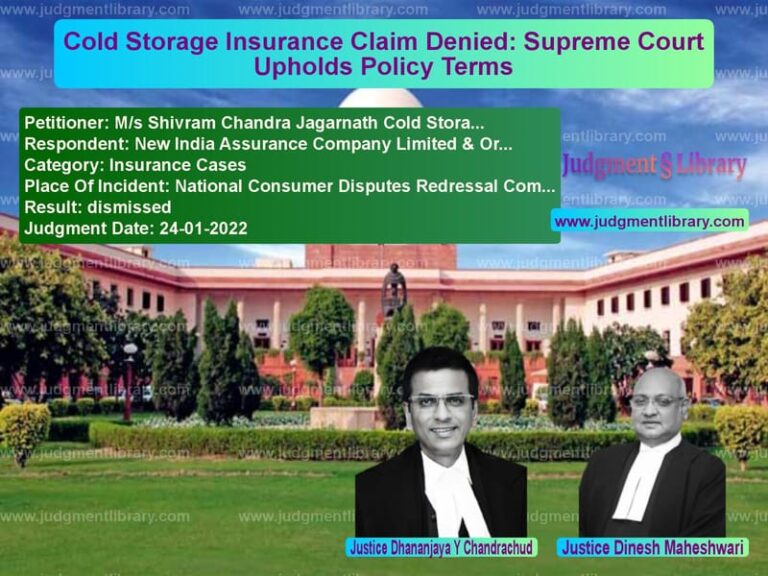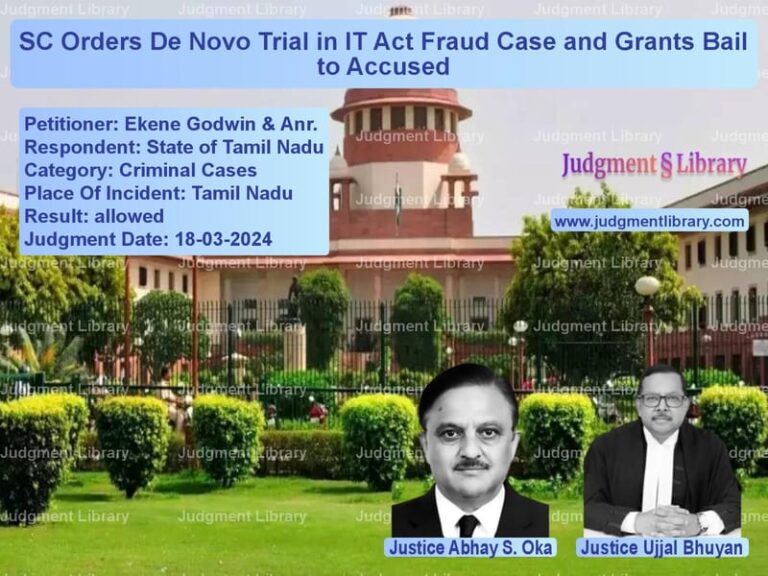Medical Test in Divorce Case: Supreme Court Upholds Husband’s Request for Potentiality Test
The Supreme Court of India recently ruled in Deep Mukerjee v. Sreyashi Banerjee, a significant case regarding medical tests in divorce proceedings. The case involved a dispute over whether a husband, accused of impotency in a divorce case, could be subjected to a medical test to determine his potentiality. The Court upheld the husband’s right to undergo the test voluntarily while protecting the wife’s right to refuse fertility and mental health tests.
Background of the Case
The couple married on July 23, 2013, in Chennai and later moved to the United Kingdom, where they lived together for 7.5 years. After returning to India, disputes arose, and they separated in April 2021. The husband, Deep Mukerjee, alleged that the wife, Sreyashi Banerjee, refused to communicate or resume marital relations.
The husband filed for restitution of conjugal rights under Section 9 of the Hindu Marriage Act, 1955, while the wife filed for divorce under Section 13(1)(ia) of the Act, citing mental cruelty and claiming that their marriage was never consummated due to the husband’s impotency.
In response, the husband moved an application before the Trial Court under Section 45 of the Indian Evidence Act and Section 151 of the Code of Civil Procedure (CPC), requesting:
- A medical test to determine his sexual potentiality (potency test).
- A fertility test for the wife.
- A psychological and mental health evaluation for both parties.
The Trial Court allowed the husband’s request, directing a medical board at Rajiv Gandhi Government General Hospital, Chennai, to conduct the tests and submit a sealed report.
The wife challenged this decision in the High Court, which set aside the Trial Court’s order. The husband then appealed to the Supreme Court.
Arguments by the Appellant (Husband)
- The husband argued that since the wife had accused him of impotency, a medical test was necessary to refute the allegation.
- He voluntarily agreed to undergo the test and contended that refusing such a test would lead to an unfair presumption against him.
- He relied on the Supreme Court’s decision in Sharda v. Dharmpal (2003), which allowed medical examinations in divorce cases when necessary.
Arguments by the Respondent (Wife)
- The wife contended that she could not be forced to undergo medical tests against her will.
- She argued that her claim of non-consummation was based on her personal experience and did not require medical proof.
- She further stated that medical tests should not be used to determine her mental health in a divorce case.
Supreme Court’s Key Observations
- The Court noted that the High Court had not provided any specific reason for setting aside the entire Trial Court order.
- It emphasized that when a spouse voluntarily agrees to undergo a medical test to defend against allegations, the court should not prevent it.
- The Court reaffirmed its decision in Sharda v. Dharmpal, which held that courts could direct medical examinations in matrimonial cases, provided they were necessary and did not violate fundamental rights.
Final Judgment
The Supreme Court ruled:
“When the appellant/husband is willing to undergo a potentiality test, the High Court should have upheld the Trial Court’s order to that extent.”
The Court allowed the appeal in part, reinstating the Trial Court’s order concerning the husband’s potency test. However, it upheld the High Court’s decision regarding the wife’s right to refuse the fertility and mental health tests.
The Supreme Court directed that:
- The husband must undergo a potentiality test within four weeks.
- The test should be conducted by a medical board and submitted to the court in a sealed cover.
- Neither party should disclose the test results to third parties.
Implications of the Judgment
- The ruling reinforces the principle that a person accused of impotency in a divorce case has the right to undergo medical tests to prove otherwise.
- It affirms that medical tests in matrimonial disputes should be voluntary and cannot be imposed on unwilling parties.
- The judgment strikes a balance between the right to defend oneself and the right to bodily autonomy.
- It sets a precedent for similar divorce cases where allegations of impotency are contested.
Conclusion
The Supreme Court’s decision in this case clarifies the legal position on medical tests in divorce proceedings. By upholding the husband’s right to a potentiality test while protecting the wife’s right to refuse medical examinations, the Court has reinforced the importance of fairness and individual rights in matrimonial litigation.
This judgment serves as a guide for future cases where allegations related to sexual health arise in divorce proceedings, ensuring that medical evidence can be considered while respecting personal dignity and consent.
Petitioner Name: Deep Mukerjee.Respondent Name: Sreyashi Banerjee.Judgment By: Justice Vikram Nath, Justice Prashant Kumar Mishra.Place Of Incident: Chennai, Tamil Nadu.Judgment Date: 05-04-2024.
Don’t miss out on the full details! Download the complete judgment in PDF format below and gain valuable insights instantly!
Download Judgment: deep-mukerjee-vs-sreyashi-banerjee-supreme-court-of-india-judgment-dated-05-04-2024.pdf
Directly Download Judgment: Directly download this Judgment
See all petitions in Mutual Consent Divorce
See all petitions in Alimony and Maintenance
See all petitions in Domestic Violence
See all petitions in Judgment by Vikram Nath
See all petitions in Judgment by Prashant Kumar Mishra
See all petitions in partially allowed
See all petitions in Modified
See all petitions in supreme court of India judgments April 2024
See all petitions in 2024 judgments
See all posts in Divorce Cases Category
See all allowed petitions in Divorce Cases Category
See all Dismissed petitions in Divorce Cases Category
See all partially allowed petitions in Divorce Cases Category

